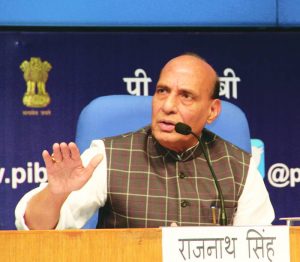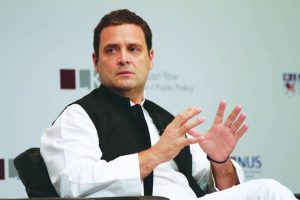Odds on Ombudsman
Something odd took place at the July 19 meeting of the Lokpal selection committee. The committee consists of the prime minister, Chief Justice of India Dipak Misra, Speaker of the Lok Sabha Sumitra Mahajan, and jurist Mukul Rohatgi. The only progress made in the long-awaited appointment of a Lokpal was the submission to the apex court that a search was on for a search committee to shortlist suitable candidates.
Here’s where the tale gets a twist. The Supreme Court bench, headed by Justice Ranjan Gogoi, expressed disappointment with the submission in the form of an affidavit which merely recorded that the leader of the Congress had been invited but declined and a search committee would be formed.
The bigger twist is that a suggestion was made by the prime minister during the meeting that Misra himself take up the vacancy when he retires on October 1, when, by convention, Gogoi will become the CJI and hence part of the selection committee.
There is, in fact, nothing that prevents the proposed seven-member search committee from recommending Misra’s name. Sources say the CJI suggested that there be a panel of names but so far, he remains the frontrunner to become the country’s first ombudsman.
The Noose Tightens
 Rahul Gandhi’s attacks on the Modi government on the unchecked cases of lynching seem to have had the desired effect. The government has moved in haste to show it is serious about tackling the issue. There are now two separate committees looking at ways to handle the crisis, one headed by the home secretary and the other by a Group of Ministers (GoM) led by Home Minister Rajnath Singh.
Rahul Gandhi’s attacks on the Modi government on the unchecked cases of lynching seem to have had the desired effect. The government has moved in haste to show it is serious about tackling the issue. There are now two separate committees looking at ways to handle the crisis, one headed by the home secretary and the other by a Group of Ministers (GoM) led by Home Minister Rajnath Singh.
Home Secretary Rajiv Gauba will be assisted by his counterparts handling justice, legal affairs, legislative and social justice and empowerment, and recommend measures to do with the nuts and bolts of appointed nodal officers, and freeing bottlenecks. The GoM will look at how to contain the political and diplomatic fallout, which is why External Affairs Minister Sushma Swaraj is a key member, along with Nitin Gadkari, Ravi Shankar Prasad and Social Justice and Empowerment Minister Thawar Chand Gehlot. They will report directly to the prime minister.
Caging Legal Eagles
For a party that has some of the country’s most renowned law-yers within its ranks, the absence of any of these legal eagles from the newly-constituted Congress Working Committee (CWC) is hard to miss. With the exception of P Chidambaram (who has been retained as a permanent invitee), all other senior advocates associated with the party—Kapil Sibal, Abhishek Manu Singhvi, Salman Khurshid, among others—failed to find inclusion in the CWC.
This development comes at a time when Sonia Gandhi and Rahul Gandhi are facing a legal battle in the National Herald case while their party has been trying to score political points over important issues that have a direct link with judicial matters—the dilution of the SC/ST Act by the Supreme Court, the Aadhaar and Ram Janmabhoomi-Babri Masjid title suit, and so on.
With the general election drawing near, many of these legal battles will have political ramifications. So why then does Rahul not want legal luminaries of the party to get seats in the CWC?
The answer may lie in the fact that nearly all senior advocates associated with the party are involved as counsel in controversial cases in various courts, including the Supreme Court, and that they are not necessarily advocating issues that the party wants to be linked with. Sibal had triggered unwanted opprobrium with his arguments in the Ram Janmabhoomi and triple talaq cases last year. Singhvi is advocating a continuation of the ban on entry of women in Kerala’s Sabarimala Ayyappa temple—a stand that goes against the party’s strident advocacy for gender equality. Rahul believes that professional commitments of these lawyers could cost the party, politically.
The Opposition Dilemma
 The biggest hurdle facing a united opposition is the question of who will be the prime ministerial candidate. The Congress had started out with the premise that it would be Rahul Gandhi but now seems to have softened its stand, realising that there would be resistance to the proposal and it could affect the chances of bringing down the BJP and forging a truly united front. The change in stance has come from Sonia Gandhi who has told partymen via Rahul to indicate that the party would not be averse to projecting Mayawati and even Mamata Banerjee as the opposition’s PM candidate. Mamata has been speaking to Sonia quite frequently and the message seems to have got home that she is wary of supporting Rahul’s projection. The Congress’s willingness to back the two M’s is due to the reality that the only way to defeat the BJP lies in strategic alliances. The Congress fought the Bihar and Uttar Pradesh elections in alliance with the Rashtriya Janata Dal and Samajwadi Party, respectively, and with Uttar Pradesh being key to 2019, Mayawati cannot be ignored.
The biggest hurdle facing a united opposition is the question of who will be the prime ministerial candidate. The Congress had started out with the premise that it would be Rahul Gandhi but now seems to have softened its stand, realising that there would be resistance to the proposal and it could affect the chances of bringing down the BJP and forging a truly united front. The change in stance has come from Sonia Gandhi who has told partymen via Rahul to indicate that the party would not be averse to projecting Mayawati and even Mamata Banerjee as the opposition’s PM candidate. Mamata has been speaking to Sonia quite frequently and the message seems to have got home that she is wary of supporting Rahul’s projection. The Congress’s willingness to back the two M’s is due to the reality that the only way to defeat the BJP lies in strategic alliances. The Congress fought the Bihar and Uttar Pradesh elections in alliance with the Rashtriya Janata Dal and Samajwadi Party, respectively, and with Uttar Pradesh being key to 2019, Mayawati cannot be ignored.
No Caged Parrot
The bitter internal war between the two top officers in the CBI, director Alok Verma and deputy Rakesh Asthana, has crippled the agency at a time when it is investigating major cases like the PNB scam involving Nirav Modi, the Vijay Mallya, AgustaWestland and AirAsia cases and allegations of corruption against former Railways Minister Lalu Yadav and former Finance Minister P Chidambaram, among others.
It is well-known that Asthana, who had served under then chief minister of Gujarat, Narendra Modi, was fasttracked into the CBI’s number two post, not without controversy. It was the first time that the appointment of a serving top officer of India’s premier police investigating agency was heard by the Supreme Court because he was himself being investigated in a corruption case by the very agency.
Asthana belongs to the Gujarat cadre and was appointed special director of the CBI via an order issued by the Appointments Committee of the Cabinet comprising Prime Minister Modi and Union Home Minister Rajnath Singh. Asthana, incidentally, had investigated the Godhra train burning and other politically sensitive cases in Gujarat and became close to Amit Shah when he was serving in sensitive postings in Gujarat.
Now, the government seems to have backed Asthana in his battle against Verma—recommendations made by Verma for induction of some officers into the CBI were not accepted by the government.
Both officers have now written separate letters to the PMO but it is obvious who will emerge victorious in the end—at huge cost to the agency and its credibility.
Saffron Setback
The chorus from NDA allies and a section of BJP lawmakers seeking the removal of Justice AK Goel from his recent appointment as chairman of the National Green Tribunal (NGT) is expected to get louder in the coming days. Justice Goel, along with Justice UU Lalit, had authored the Supreme Court verdict that drastically watered down the SC/ST (Prevention of Atrocities) Act earlier this year.
Now, LJP chief Ram Vilas Paswan and RPI (A) chief Ramdas Athawale—both Union ministers with Dalit votebanks—and BJP MP Udit Raj, who had earlier urged the Modi government to challenge the dilution of the Act through a review petition, have demanded that the centre remove Justice Goel from his new role.
Sources say that Paswan and Athawale’s protest against Justice Goel by raising the bogey of unrest among Dalits is an excuse by the two political weather vanes to quit the NDA before the general election next year. Athawale, it is learnt, has been in talks with a former Union minister from Maharashtra to negotiate his party’s inclusion in the coalition that the Congress is trying to cobble together. Paswan, too, is eyeing a return to the UPA.
Sources say the dilution of the Act is likely to be cited by at least a dozen Dalit MPs of the BJP, like Udit Raj, to quit the party before the Lok Sabha polls and join Mayawati’s BSP, the Congress and Akhilesh Yadav’s SP. A country-wide protest against the Act’s dilution is being planned for August 9 and could give an indication of how many Dalit MPs will jump the saffron bandwagon.


